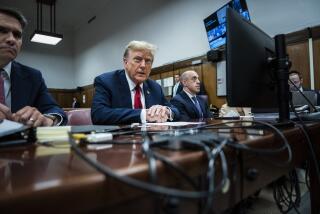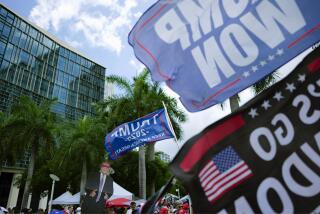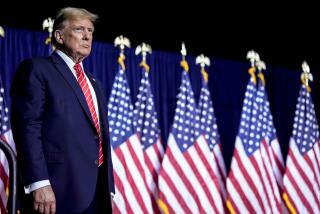Khalid Shaikh Mohammed offers to testify in New York federal trial
WASHINGTON — From his cell in the heavily guarded prison at Guantanamo Bay, the presumed chief architect of the Sept. 11 terrorist plot is offering to be a key defense witness in what probably will be the only trial in New York of someone charged in connection with the World Trade Center attacks.
This would not be the first time Khalid Shaikh Mohammed has emerged as a star defense witness for members of Al Qaeda. Twice, his words have minimized the role defendants played in the organization’s top hierarchy.
In 2006, his interrogation summaries were read aloud in the capital murder trial of Zacarias Moussaoui, the so-called 20th hijacker, and Moussaoui was spared the death penalty. Two years later, different Mohammed statements were read in a military commission trial, or tribunal, that led to the release from Guantanamo Bay of Osama bin Laden’s chauffeur, Salim Hamdan.
This time the stakes are higher. Mohammed agreed in a Jan. 27 letter from his lawyer, which was obtained by The Times, to be interviewed by defense lawyers for Sulaiman abu Ghaith — as long as federal prosecutors and military lawyers were not allowed to monitor the conversation in any way.
Abu Ghaith, the top Al Qaeda propagandist now charged in connection with the Sept. 11 attacks, goes on trial in 10 days in federal court in Lower Manhattan. And his chief attorney, Stanley Cohen, has insisted in court documents that Mohammed be allowed to speak in some capacity — in court through a live closed-circuit feed from the U.S. military prison in Cuba, in a taped interview or in a written statement.
Defense lawyers and prosecutors plan to meet Thursday with U.S. District Judge Lewis A. Kaplan to consider a trip to Guantanamo Bay. But Cohen said the government wants prosecutors and military lawyers present for the interview. That, he said, “is a deal breaker.”
If an agreement cannot be reached, Cohen said he would ask for a court order for sole access to Mohammed. He warned that, if denied it, the defense will have a strong argument on appeal should Abu Ghaith be convicted.
The U.S. attorney’s office in New York declined to comment about the matter.
What makes this dispute so unusual is that normally a defense attorney has wide latitude to talk to witnesses who might help their case, even if they never bring them into the courtroom. But because of the secrecy that has surrounded the Guantanamo Bay prison since its opening 12 years ago and because much about Mohammed remains highly classified, the government has allowed almost no one to speak to him.
Officials at the Department of Justice in Washington said they are always intrigued any time Mohammed chooses to speak. As for the Pentagon, sources said military lawyers probably would strongly oppose any arrangement between their most-valued Guantanamo Bay prisoner and outside defense counsel.
With time running out before jury selection, Cohen received a written agreement from Mohammed’s lawyer, David Nevin, stating, “Mr. Mohammed and his counsel consent to your request to an interview.”
But the letter also stipulates that it must be done “in the absence of government personnel whether physically present or by listening or recording remotely.” Nevin and lawyers for other Guantanamo Bay detainees have complained repeatedly that military guards and other government officials have spied on meetings with clients.
Nevin also wanted assurances that Abu Ghaith “supported” the interview and that the request had been made with Abu Ghaith’s “knowledge and acquiescence.” He said the interview must deal only with Mohammed’s “knowledge, or lack of knowledge,” about Abu Ghaith. He stipulated that the interview be held at a “reasonable place and for a reasonable duration,” without acknowledging that it would probably have to occur at Guantanamo Bay.
Cohen said that a New York jury would give credence to what Mohammed says, even though he has a reputation as a braggart. He noted that the federal government agreed with Mohammed’s repeated boasts that he was the chief mastermind behind the airplane attacks.
“The government sure believes him on that,” Cohen said.
Mohammed, thought to be 48 or 49 years old, has declared he was Bin Laden’s right-hand man in devising the plot.
Indeed, some reports say he was so deeply involved in the planning that at one time he volunteered to pilot an additional plane, kill the male passengers and release the women and children upon landing safely.
He was captured in 2003 hiding in Pakistan. Held in secret custody and subjected to repeated sessions of waterboarding and other enhanced interrogation techniques, Mohammed in 2007 was transferred to Guantanamo Bay.
There, in a closed door hearing, he proclaimed: “I was responsible for the 9/11 operation, from A to Z.” He also confessed to organizing the 1993 World Trade Center bombing, personally beheading Wall Street Journal reporter Daniel Pearl and setting in motion the 2001 attempted shoe bombing aboard a U.S.-bound airliner.
Those statements and others in which Mohammed boasted broadly about his leadership role in Al Qaeda were introduced in the Moussaoui trial in Alexandria, Va., and used to deflect incriminating suspicions that Moussaoui was more deeply involved in ongoing plots. The jury gave Moussaoui life in prison rather than the death penalty.
Shorter statements were read in the military commission trial for Hamdan. Rather than brag about his own reputation, Mohammed instead dismissed Hamdan as being of little importance to Al Qaeda.
“He did not play any role. He was not a soldier, he was a driver,” Moussaoui said, adding that Hamdan was not fit to develop or execute a terrorist attack. “He was not at all a military man.” Hamdan was later released and returned to Yemen.
Mohammed is one of five defendants now in the pretrial phase of a military commission trial at Guantanamo Bay. All are considered the top Sept. 11 plotters and face the death penalty. Indeed, the Justice Department earlier tried to stage their trial in the same New York courthouse where Abu Ghaith is being prosecuted. But a storm of protest ensued, and the Obama administration backed off.
Abu Ghaith, a bearded, 48-year-old Kuwaiti and Bin Laden’s son-in-law, is charged with conspiring with other top Al Qaeda leaders to murder Americans.
He also is accused of making more threats after the Sept. 11 attacks, warning that “the storms shall not stop, especially the Airplanes Storm.” He allegedly advised Muslims, children and opponents of the U.S. not to board aircraft or live in high-rise buildings. He faces life in prison.
To blunt that kind of evidence, Cohen believes Mohammed is crucial to his client’s defense, even if it causes a short delay in the trial.
“Mr. Mohammed is the most qualified person alive,” he said. “Most importantly, Mr. Mohammed’s knowledge of, and role in, Al Qaeda’s terrorist activities, if true, can only be described as staggering.”
More to Read
Start your day right
Sign up for Essential California for news, features and recommendations from the L.A. Times and beyond in your inbox six days a week.
You may occasionally receive promotional content from the Los Angeles Times.







